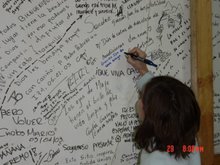 So, what is writing?
So, what is writing? Writing, especially academic writing, can mean many different things these days. But prior to the computer boom, along with the coming of blogs, email, facebook, and all the other new technology, I believe that writing has not only changed the scope but academic writing is changing altogether.
Academic writing, in the most sincere form, is an in-depth process, one in which you can't simply flush out a paper over night or turn in a first-draft. In fact, we still follow this process in many of our college classes still today, whether a dissertation is being written or a term paper, or some lab write up of our findings or results. Thus, the process is as follows: you brainstorm, outline, prewrite, write, revise, edit (whether it be with a peer or professor) and finally, publish. And this is done with many things, as indicated by the collage above: a poem is even revised, whereas a personal diary imitates the beginning stages of the writing process in which the author is brainstorming and simply putting in print whatever comes to his/her mind first.
But I think what is interesting, is that given our new technology, the face of academic writing is changing. We are brainstorming in blogs and online, we write and prewrite on the computer instead of paper, and we partake in the peer review process via email or other ways. Although this doesn't necessarily mean that the whole process of academic writing is changed, but the ways in which we do it are different. I think that this changes our conception of writing because it connects us more and becomes more interactive. Changes and revisions can be made at a split second and information (although we must be weary of the source and the validity) are at the click of a mouse.
But what about the consequences? Is this all good? In a sense, I think we still must be careful. With the vast information and the connectivity that academic writing now brings with it, we have to be careful of things that the YouTube video said we should be weary of. For example, what are the new indications that this brings about for copyright, plagiarism, piracy, privacy, and intellectual property rights in general? Yet, I believe that as long as we have the old protocol in place (brainstorm, prewrite, write, revise, edit, etc) some of these things can be mediated and we can understand how to handle them.
Thus, I believe that even though some of the academic writing as we were taught are in fact, outdated, the process itself must still stand in place as a check of the new and fast-paced media that is constantly in our face. We must have a curriculum that strikes a balance between the old and the new, because with out the old process itself, academic writing could turn into a informal, unchecked, and unethical process.


3 comments:
"We must have a curriculum that strikes a balance between the old and the new, because with out the old process itself, academic writing could turn into a informal, unchecked, and unethical process."
I completely agree with you here. What your post suggests for me is the potential problems with thinking of new media as something vastly different or even indistinguishable from more traditional print-based media. (One could argue in fact that the YouTube clip we watched today makes this claim.) So, with you, I would argue for more nuanced ways of thinking of new media, perhaps looking at how digital writing work to intensify or make more visible already existing print-based processes.
I think it will be interesting to see how the formality of writing and English usage continues to evolve into the coming years. Jonathan made a comment in his blog about how these fast rhetorics are causing a shift toward poor grammar and style and I totally agree. Even more, I believe that the younger generations, those growing up with an immersion of instant/text messaging lingo, are going to continue to degrage the "correct" usage of the English language without respect to socioeconomic status.
I really like how you are very concerned about copyright and things like that. I also agree that with such a vast network, these things can be abused very easily. furthermore, i think that teaching the 'old ways' of drafting, editing, proofreading, etc. will help with these abuses.
Post a Comment